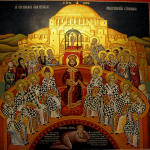
This was originally a “nutshell” (ha ha!) argument, made on my Facebook page, then it became extended as longtime reader Felix Lopez (his words in blue below) interacted with it (I love when that happens!), and I further honed my argument. I’ll tweak it a bit more presently.
*****
Pope St. Peter wrote that “The Lord . . . is forbearing toward you, not wishing that any should perish, but that all should reach repentance” (2 Pet 3:9, RSV). Paul referred to “God our Savior, who desires all men to be saved and to come to the knowledge of the truth” (1 Tim 2:3-4). In this sense we can say that God “desires” that hell would be empty, while knowing in fact that it will not be. He “wishes” and “desires” that none would have to go there. That would be His perfect will. But in theology we also refer to His permissive will, that incorporates human free will choices that entail many rejecting Him.
*
Reprobates do end up in hell because they have free will and have rejected God’s grace. So does it make any sense to say that God shouldn’t desire that all are saved (or that we shouldn’t mirror His own will)? The case many try to make against such desire or wishing or prayers that all would be saved thus collapses by reductio ad absurdum.
*
We pray for individuals to be saved. In the same context of one of the passages about God above, St. Paul states, “I urge that supplications, prayers, intercessions, and thanksgivings be made for all men” (1 Tim 2:1). Theoretically, if we take “all” literally, this could include every person on the entire earth, and in fact, every person who ever lived (retroactive prayer). Christians ought to love all people, too. Therefore, in such prayers we are wishing and desiring that every individual would be saved, while knowing (if we read the NT) that not all will be. We still pray for that because in our limited knowledge we know no one’s eternal destiny (save for Judas and saints).
*
One could pray, for example, that the Hamas terrorists who committed all the atrocities last October in Israel and were later killed by the Israeli Army, repented before death and were saved; while knowing that most likely were not, and went to hell with those grave sins and rejection of God in their souls.
*
We pray for anyone and everyone, that God has mercy on their souls. And so He does. But if they ultimately reject God, they do, and wind up in hell. I’ve devoted my life to the goal of trying to help get as many people saved and out of hell as I can, by God’s grace and enabling power and knowledge.
*
In any event, this thinking is not universalism. It’s a completely biblical sentiment, per the above.
*
The objection made is that “hope” and “desire” for a thing are different things. We may desire for a thing that we know for certain won’t happen, but we cannot “hope” for it because that entails expecting it to probably happen. Since there is a virtual unanimous interpretation of the Saints that says we know for certain that Hell is not empty, then it is unreasonable to “hope” for such a thing.
*
I think I overcame that by making an argument that we desire and wish (and hope?) for each individual’s salvation, which we can extend to all human beings. In that way we can desire and wish (and hope?) that all (i.e., the collection of all individuals) would be saved (since we don’t know who will be), while knowing that not all people will in fact be saved, since the NT has a lot about hell and about reprobates who end up there.
*
I’ve thought of that, but it still does not seem logical to me. You know that all will not be saved because God himself said so, but yet you hope that it is not so at the same time? It makes my brain spin in circles.
*
Again, we can wish and pray (and hope?) that individual x will be saved, because we don’t know the future. If we can do that, we can pray for each or every or any individual x, up to and including every human being who ever lived. It’s because we don’t know the answer, that we can do it. We can simultaneously wish all were saved and know that they won’t be. We can know that universalism is false, just as God knows it. What we can’t know are the particulars of who is a sheep and who is a goat. I agree that technically we can’t hope that hell will be empty because revelation rules that out, and the Bible doesn’t use the word “hope” when referring to God wishing for or desiring the salvation of all. My argument works, I think, on the individual level, as I have laid it out.
*
Again you’re conflating “hope” for all with desire for all when you start adding other similar yet different words after “and.” It just doesn’t work because hope involves expectation for the future too whereas desire does not. Logically the only way to square it is to do what Hans Urs Von Balthasar proposes of changing our interpretation of the relevant scriptures so that we no longer can know for certain that Hell is populated despite countless quotes of Saints, Church Fathers, and Doctors. Then you can say “hope that all be saved” logically. Your mentor Fr. John Hardon rejected Balthasar’s book on the topic.
*
So you contend that we can desire and wish that no individual or any individual would be damned, but cannot hope for the same? My argument is that since God Himself “wishes” or “desires” “that all should reach repentance” (2 Pet 3:9; 1 Tim 2:3-4) therefore we can do the same. My case doesn’t stand or fall on the word “hope” but rather, on the above Scriptures. No one can say that we can’t do what God does (if we’re able to do it). See also:
*
1 Timothy 4:10 For to this end we toil and strive, because we have our hope set on the living God, who is the Savior of all men, especially of those who believe.
*
Titus 2:11 For the grace of God has appeared for the salvation of all men,
*
I do not think we could logically extend “hope” for a large mass of individuals to all or the collective of all humanity. It’s too much of a leap in logic and which would violate the principle of non-contradiction because of our belief in a populated hell. “Desire” and other words used in the sense of mere desire fits with logic. We have to keep in mind that it’s very easy to think illogical thoughts and the greatest among us do it too. It’s part of our common human condition in our current mode of existence.
*
I agree with you (according to what you are saying). I ain’t a universalist. I have opposed that doctrine as an apologist for 43 years. So you agree if we use the words “desire” or “wish” because God does both things in Scripture and we can’t possibly disagree with it. So, bottom line, we agree.
*
It still remains true that if I say, “I hope Bill will be saved” then I can also say, “I hope three billion human beings will be saved and attain heaven.” That’s still possible, because we don’t know the percentages. There are about eight billion people alive today. But technically we can’t say, “I hope hell will be empty,” or definitely not, “hell will be empty” because we already know from Revelation that this is false. If we “hope that no one will be damned” that is also a non-starter. We know for a fact that some or many will be. But since we don’t know the eternal fate of individuals, save for the saints and Judas, we can hope that any and many of them will be saved, and we can — like God — wish and desire that all of them were, knowing — like God does — that they won’t be in fact.
*
You talk about logic. I love logic! Here’s some for you:
*
1. The Bible says that God “wishes” and “desires” that none perish, even though He knows many will.
*
2. A scenario in which none perish is logically identical to an empty hell.
*
3. Following God’s model, we can have the same wish and desire that none perish — all the more so, since, unlike God, we don’t know the eternal destiny of almost all people (minus saints and the devil).
*
4. Therefore, we can “wish” and “desire” that hell is empty, even though we know from inspired revelation that it won’t be. We’re simply doing what God already does.
*
5. We can also hope that all are saved and that hell is empty, on the basis of Thesaurus.com, which lists “wish” and “desire” as synonyms for “hope” (my italics and bolding):
*
achievement
ambition
anticipation
aspiration
belief
concern
confidence
desire
expectation
faith
goal
optimism
promise
prospect
wish
*
6. In normal conversation, we often use “hope” as a synonym for “wish” or “desire”. So, for example, instead of saying, “I wish that my wife would bake me lasagna tonight,” or “I desire that my wife would bake me lasagna tonight,” we would usually say, rather, “I hope that my wife bakes me lasagna, tonight.”
*
7. The difference in this discussion is that we are talking about wishing for a thing (all being saved) that we know will not be true in fact, from God’s revelation. We know the future in this instance. So the argument is that we can’t hope for such a thing that simply will not be, and that we know will not be. But then it would seem that we can’t wish or desire it, either, on the same basis (knowing it won’t come to pass). But God in fact does that; so we can, too! In this sense, saying that we hope for this is not all that different than saying we wish or desire it; though there is clearly a sense in which it is different, too.
*
8. As I argued above, if we can say, “I hope Person X is saved,” then we can also (in our lack of knowledge of the eternal destiny of any and every human being) say that about every human being who ever lived — save for Judas –, and say, “I hope that x [times billions] is saved.” That’s the same thought, simply multiplied by almost all people. But to have a thought that all are saved is to at the same time have in mind the notion that hell is empty.
*
9. Therefore, it all goes back to God wishing and desiring that all be saved. God desires that which He knows will not be, out of His infinite love and mercy. We are also expressing love and mercy when we desire that all be saved, or even hope that they are, while knowing all the while that not all will be. It’s the language and will and emotion of love.
*
10. In other words, none of this is a denial that hell exists or a proclamation of universalism. It only is if someone who actually believes in either false thing is exploiting it for the purpose of promulgating one or more false doctrines that they already held on other grounds before they came to this discussion. There are always theological liberals who will warp any and every true doctrine in the Bible. But a distortion of a thing is not the same as the thing itself, and we don’t throw the baby out with the bathwater.
*
There is St. Thomas Aquinas’ definition of hope. Hope is the theological virtue. So, you have to address it from the theological usages and original biblical languages. Not from a secular website for modern English. When I started this thread I was already going above my weight class.
*
[I cited the words of James T. O’Connor from the end of this article]
*
Seems reasonable to me. When I think about it, whenever I desire something there is some form of faint “hope” there that is unconscious since intellectually I know for certain it is impossible for me to obtain it because it’s too expensive or I don’t have the natural traits & capabilities needed or it’s sinful or more heroically virtuous than I can reasonably handle. For us humans “desire” and also the emotional pre-disposition of “hope” that we express in imprecise colloquial terms probably works differently than for God who transcends our emotions and transcends time & space. So, it is a mystery how he is motivated to continually supply superabundant salvific grace to all including the damned and interacting with all of us in our prayers and granting us temporary state of grace at different moments of life all while at the same time foreknowing who the damned are.
*
Lastly, I made an argument in June 2023 about how many will be saved:
*
The Bible appears to teach in some places that few are saved: Matthew 7:14 (“For the gate is narrow and the way is hard, that leads to life, and those who find it are few”) and Luke 13:23-30 (13:24: “Strive to enter by the narrow door . . .”). These are good, solid arguments. But there are other indications that half or more human beings may be saved. In the parable of the ten maidens with lamps (Mt 25:1-13), five were foolish and were damned (“the door was shut . . . I do not know you”: 25:10, 12) and five were wise and received eternal life (“went in with him to the marriage feast”: 25:10). It’s a 50-50 proposition.
The parable of the talents follows (25:14-30). Here, there are three servants, who are given five talents, two talents, and one talent [a form of money], respectively. The ones who are saved are the first two (“enter into the joy of your master”: 25:21, 23), while the servant with one talent, who did nothing with it, was damned (“cast the worthless servant into the outer darkness”: 25:30). So this parable suggests a 67% rate of final salvation and a 33% rate of damnation. If we take the average of the two, we arrive at a figure of 58.5% being saved in the end, and 41.5% damned. Who knows? Both are right from the lips of Jesus, and parables always mean something. It’s interesting to ponder the implications.
*
*
*
*
*
*
*
*
*
*
**
Von Balthasar and Salvation (James T. O’Connor, Homiletic & Pastoral Review, July 1989)
The Population of Hell (Avery Cardinal Dulles, First Things, May 2003)
The Population of Hell (Jimmy Akin, 5-2-04)
Praying For What Won’t Happen (Jimmy Akin, 5-5-04)
Was Balthasar a Heretic? (R. R. Reno, First Things, 10-15-08)
Is Hell Crowded or Empty? A Catholic Perspective (Bishop Robert Barron, Word on Fire, 3-30-11)
“Dare We Hope?” Resource Page (Word on Fire)
Bishop Barron’s Foreword to Hans Urs von Balthasar’s book, Dare We Hope That All Men Be Saved? (1-12-15)
Did Hans Urs von Balthasar Teach that Everyone Will Certainly be Saved? (Mark Brumley, The Catholic World Report, 21 Nov. 2013)
What is Hopeful Universalism? (Trent Horn, Catholic Answers, 11-7-19)
James T. O’Connor made a helpful observation in his article above:
In the light of what it has been given us to know, we must presume that (in numbers completely unknown to us) humans will be included in “the eternal fire prepared for the devil and his angels” (Matt. 25:41), and that we ourselves could be among that number. . . . Against such a presumption one cannot have what is properly defined as theological hope, but one can and must have a human hope, a wish which expresses itself in prayer and zealous efforts, for the salvation of all. For we do and must pray: “Jesus, forgive us our sins, save us from the fires of hell. Lead all souls to heaven, especially those who have most need of your mercy.”
***
*
Practical Matters: Perhaps some of my 4,500+ free online articles (the most comprehensive “one-stop” Catholic apologetics site) or fifty-five books have helped you (by God’s grace) to decide to become Catholic or to return to the Church, or better understand some doctrines and why we believe them.
Or you may believe my work is worthy to support for the purpose of apologetics and evangelism in general. If so, please seriously consider a much-needed financial contribution. I’m always in need of more funds: especially monthly support. “The laborer is worthy of his wages” (1 Tim 5:18, NKJV). 1 December 2021 was my 20th anniversary as a full-time Catholic apologist, and February 2022 marked the 25th anniversary of my blog.
PayPal donations are the easiest: just send to my email address: [email protected]. Here’s also a second page to get to PayPal. You’ll see the term “Catholic Used Book Service”, which is my old side-business. To learn about the different methods of contributing (including Zelle), see my page: About Catholic Apologist Dave Armstrong / Donation Information. Thanks a million from the bottom of my heart!
*
***
Photo credit: tombud (6-13-16): “planet hell mystical fantasy” [Pixabay / Pixabay License]
Summary: I tackle the vexed and much-misunderstood “empty hell” or “hoping that all will be saved” discussion, anchoring my thoughts in God’s “desire” (1 Tim 2:4 & 1 Pet 3:9).














